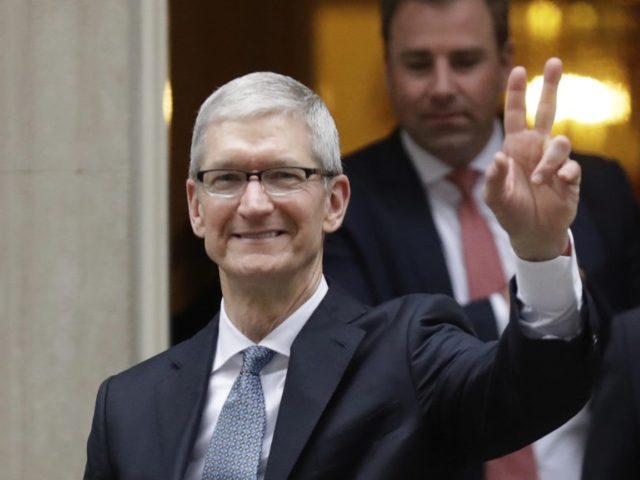In a recent op-ed in the Wall Street Journal, Apple CEO Tim Cook boasted about his company’s social justice initiative amidst the coronavirus pandemic.
In a recent op-ed published in the Wall Street Journal, Apple CEO Tim Cook reflects on the last year and the effect of the coronavirus pandemic, which he says was a year where “critical conversations about equity and systemic injustice attained both new urgency and a well-deserved central role in our national conversation.”
Cook goes on to discuss how the virus affected the world, and how “structural discrimination” resulted in some people being affected more negatively than others. Cook writes:
In simple theory, a disease should affect all of us equally. But in plain fact, the opposite is true. We have all seen, in real time, how structural discrimination and obstacles to opportunity do their work in a crisis. In our communities, every burden—from rates of infection and care outcomes, to economic adversity, to the challenges of virtual learning when schools are closed—falls heaviest on those for whom true equity has always been farthest from reach. As someone who grew up during the civil-rights movement, it has been frustrating to see how much work is still to be done but heartening to see the degree to which people of good will have set aside comfort with the status quo to march and to demand something better.
Cook stated that Apple’s approach to times of crisis is asking “how can we help?” which has resulted in investments in social justice and racial equality initiatives. Cook states:
And it’s led us to undertake major new investments through our Racial Equity and Justice Initiative. These projects include the Propel Center in Atlanta, which we’re helping to build in partnership with the country’s historically Black colleges and universities, to support the next generation of leaders of color in fields ranging from machine learning to app development, entrepreneurship to design; and our first Apple Developer Academy in the U.S., in downtown Detroit, home to more than 50,000 Black-owned businesses and no shortage of great ideas for the app economy.
Despite Cook’s dedication to social justice and racial equality, it appears that this dedication does not extend outside of America. It was reported last year that iPhone manufacturers in China were using forced labor from Uyghur Muslims held in Chinese concentration camps. Breitbart News reported at the time:
The Tech Transparency Project (TTP) is a non-profit watchdog group that has challenged claims by Western tech companies like Apple that their supply chains are completely free of forced labor. On Tuesday, TTP showed documents to the Washington Post that demonstrated thousands of Uyghurs were sent to work for Lens Technology, one of the oldest suppliers for Apple, Inc.
Apple consistently claims it has “zero tolerance for forced labor” and conducts vigorous reviews to ensure no Uyghur labor is used in its products, and repeated that denial in response to the Washington Post report, but TTP said its documents prove there are indeed thousands of Uyghurs working at Lens Technology plants.
“Our research shows that Apple’s use of forced labor in its supply chain goes far beyond what the company has acknowledged,” TTP director Katie Paul told the Washington Post.
“Apple claims to take extraordinary measures to monitor its supply chain for such problems, but the evidence we found was openly available on the Internet,” she added.
Read more at Breitbart News here, and read Cook’s full op-ed in the Washington Post here.
Lucas Nolan is a reporter for Breitbart News covering issues of free speech and online censorship. Follow him on Twitter @LucasNolan or contact via secure email at the address lucasnolan@protonmail.com

COMMENTS
Please let us know if you're having issues with commenting.